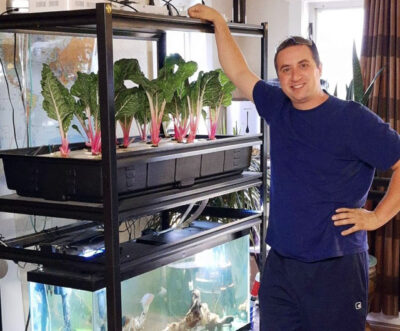City youth recognized as environmental innovators
By Alejandra Pulido-Guzman - Lethbridge Herald on July 27, 2023.
 Submitted photo
Michael Lavorato, along with project partner Gabrielle Kirk recently participated in the Commission for Environmental Cooperation (CEC) Youth Challenge and were awarded $15,000 for their water-wise solution for sustainable food production, Aquaponics World.
Submitted photo
Michael Lavorato, along with project partner Gabrielle Kirk recently participated in the Commission for Environmental Cooperation (CEC) Youth Challenge and were awarded $15,000 for their water-wise solution for sustainable food production, Aquaponics World.LETHBRIDGE HERALDapulido@lethbridgeherald.com
Two Lethbridge youth were recently recognized by Canadian Minister of Environment and Climate Change, Steven Guilbeault as Canada’s newest environmental innovators after participating and winning in a youth challenge.
 Lethbridge residents Gabrielle Kirk and Michael Lavorato recently participated in the Commission for Environmental Cooperation (CEC) Youth Challenge and were awarded $15,000 for their water-wise solution for sustainable food production, Aquaponics World.
“The commission has an annual advisory council session that gathers every year, and this year they also happen to add a youth innovation challenge where it was a competition, you could submit the work that you’re doing and then a panel judges judged it, and then there was a winner from each country, so we were the winners from Canada,” said Kirk.
She said there were around 70 applications, where two teams won from Mexico, and one won from the United States as well.
Kirk said their Aquaponics World is a social enterprise based out of southern Alberta with the goal of promoting environmental leadership in youth, sustainable agriculture and food security.
 She said with Lavorato they build small scale aquaponics systems in schools, libraries and senior centres, but mainly in schools.
 “Aquaponics is basically growing plants and fish together in a closed loop environment that really mimics our natural biological processes. The fish create waste and then bacteria break down that waste into nutrients for plants, then the plants absorb the nutrients and they clean the water for the fish, and it’s just this continuous closed loop cycle so it uses no fertilizers or pesticides which cause a lot of environmental damage,” said Kirk.
 She said their aquaponic systems do not use any synthetic fertilizer or chemicals, it grows plants three times faster, uses six times less land, and uses 90 per cent less water than the traditional growing practices and therefore it is a sustainable form of agriculture especially while facing climate change, droughts and water scarcity.
 “We build these small scale systems in schools from Kindergarten to Grade 12 and we teach kids about the principles of aquaponics, trying to promote an environmental leadership in youth in the area,” said Kirk.
She said they tailor their teachings to the Alberta curriculum so it can be incorporated into any classroom.
Kirk said Aquaponics World was founded in 2018 and since then they have been able to receive different types of funding to be able to build the aquaponic systems for schools free of charge.
“We applied for this competition just because it really aligned with a lot of the stuff that we were doing, and then we ended up winning which is nice,” said Kirk.
She said they are always looking for opportunities to share their Aquaponics World with schools and other educational centres, and if anyone is interested in learning more to contact her at gabriellekirk5@gmail.com
Follow @APulidoHerald on Twitter
16-15




